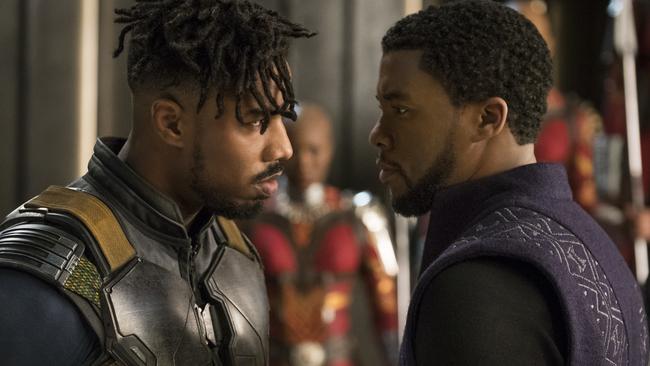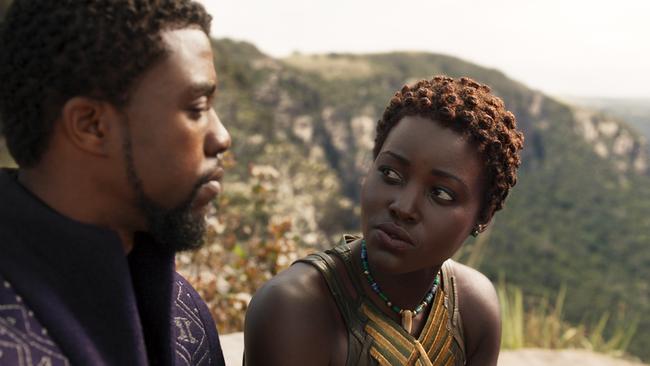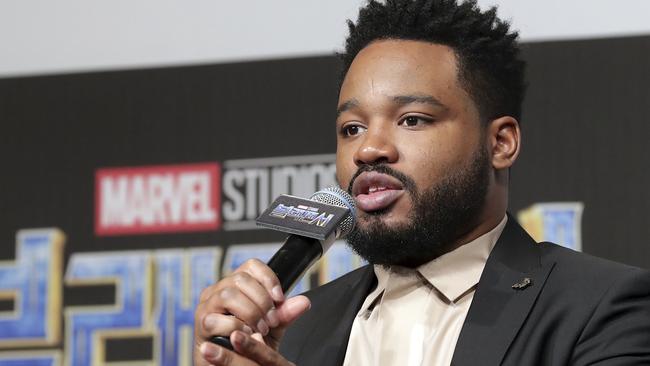Black Panther director Ryan Coogler on political coincidence
BLACK Panther is breaking box office records and setting the critical sphere alight for its clever political allegories. Its director said it wasn’t all intentional.
WHEN Ryan Coogler’s first movie debuted at the Sundance Film Festival in 2013, he was only 26 years old.
That movie, the wrenching and moving Fruitvale Station, told the real-life story of African-American man Oscar Grant and the 24 hours leading up to his shooting death by a police officer in the San Francisco Bay Area in 2009.
Coogler made Fruitvale Station for less than $1 million. He leveraged his success on Fruitvale Station to take the helm on well-received Rocky spin-off Creed, which had a budget of $40 million. His new movie out this week, Marvel’s latest superhero epic Black Panther, had a $200 million budget.
Marvel originally hired steady hands like Jon Favreau and Kenneth Branagh to direct its movies but have increasingly turned to hotshot young directors like Coogler, James Gunn (Guardians of the Galaxy), Taika Waititi (Thor: Ragnarok), Jon Watts (Spider-Man: Homecomin g) and the team of Anna Boden and Ryan Fleck on the upcoming Captain Marvel — filmmakers who can bring their own vision but stay within the parameters of a blockbuster studio picture in an established and highly profitable cinematic universe. So be creative, but not a renegade.
It’s a balance that’s worked pretty well so far.

Coogler’s two previous films have excelled in highlighting the personal connections in stories with grand implications, a deftness he carries through to Black Panther.
“The Marvel guys were always supportive of the film being personal,” Coogler told news.com.au. “They also want the film to work on an epic scale and have the scope that people are used to seeing, and the third act delivers on what third acts should be with that scale.
“But in the time leading up to that, we were laying the groundwork for each one of those characters on a personal level. Those personal scenes, that intimacy, were something we wanted from the very beginning, just so people will still relate to the characters when the time came.”
That means giving the characters room to breathe, to talk and interact in ways that didn’t involve high kicks and air tumbles. When Chadwick Boseman’s T’Challa and Lupita Nyong’o’s Nakia hint at their romantic history, it feels earnt and familiar.

A Bay Area native, Coogler invoked a strong sense of place in Fruitvale Station and did the same for Creed’s Philadelphia. The challenge was a bit different with Black Panther as it involved creating a fictional world non-comic book readers didn’t know: Wakanda.
“We knew that if we couldn’t make Wakanda feel like a real place — living, breathing and alive — the movie just wouldn’t work,” Coogler said. “Hannah Beachler, my production designer from my last couple of movies, has an incredible imagination and shares a fondness for passionate detail and obsessive research, like me.
“We went nuts researching cultures on the continent of Africa and anthropological history all over the world to build a history of Wakanda and observe their culture.”
The team also relied on the Black Panther comic books, more than 50 years of it.
The result is a vivid world with vibrant colours, a blend of tribal cultural history and hi-tech utopia, thanks to Wakanda’s miracle resource, “vibranium”. And it also feels present and connected to real-world events in 2018 with its political allegories of isolationism and race discrimination.
“We wanted Wakanda to feel lived in. We wanted to make it feel relatable, no different than when you watch Iron Man and it looks like the Los Angeles of that time. The world feels grounded and it feels like this character is running around among us.
“We wanted to have this country live side-by-side with our country, and going through situations everybody’s countries go through. We looked to modern events but a lot of that stuff was coincidental. When we wrote the script a couple of years ago, we had no idea we would be here, in February 2018.
“Even the line you mention [“Only fools build barriers”], when we were writing that scene, we were looking for African proverbs and my wife actually found that one, it’s a very old concept.”

Much has been made about the cultural significance of Black Panther, a superhero epic starring, directed and written by black people. That too feels personal, and long overdue.
Like Wonder Woman before it, it seems superhero movies are the yardstick by which we measure representation on screen — if nothing else but for the fact that these movies are incredibly expensive to make and reach a lot of people around the world.
“It’s always beautiful for the audience to be shown something different, something they haven’t seen before,” Coogler said. “We pull from a lot of concepts and ideas that came beforehand but I think our finished product is unique.
“I think there’s something in this film for everybody, regardless of what country people are from or their political persuasion. And wouldn’t it be cool if it opens up the marketplace for more things like it?”
Black Panther is on track to make big money with analysts forecasting a $US160 million opening weekend in the US. This week, Twitter announced Black Panther is the most tweeted about movie of the year so far.
Black Panther is in cinemas now.
Share your movies and TV obsessions with @wenleima on Twitter.



